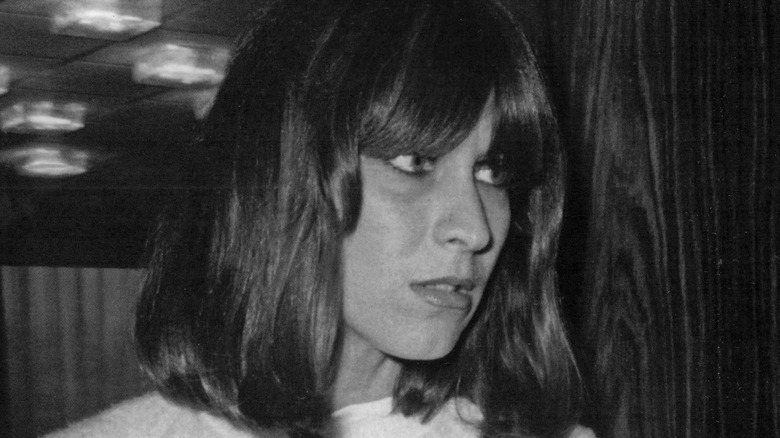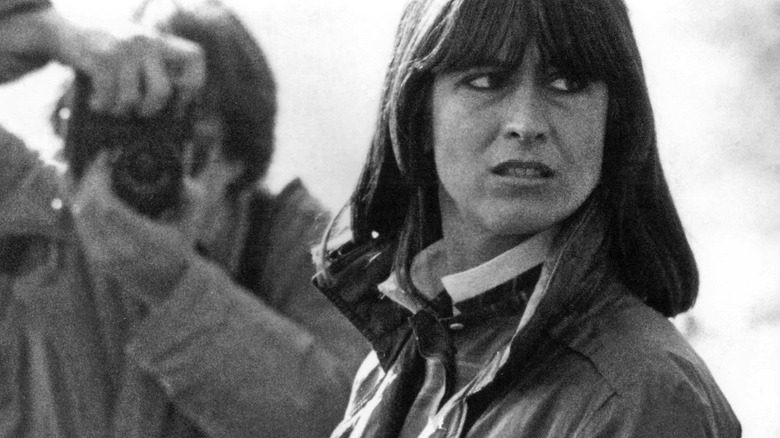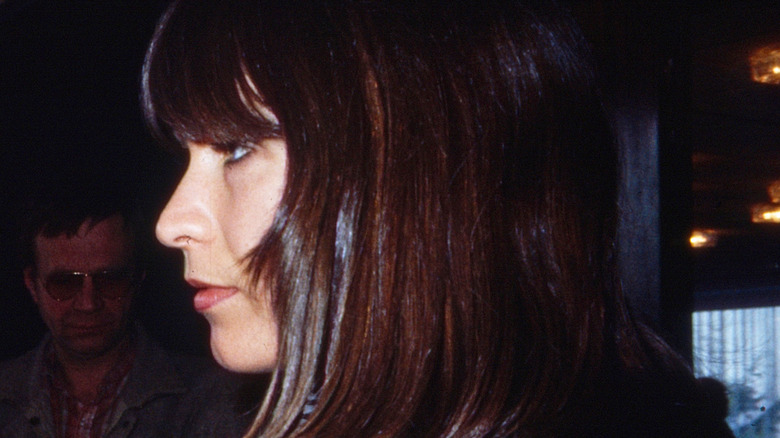The Tragic Story Of Marianne Bachmeier And The Murder Of Her Daughter
On March 5, 1980, 7-year-old Anna Bachmeier was playing hooky from school in her hometown of Lübeck, West Germany. Per OK Bliss, she'd fought with her mother that morning and went over to a neighbor's house to play with his cats. That neighbor was Klaus Grabowski, a 35-year-old butcher with a criminal record of child abuse. He had, according to NDR, voluntarily submitted to chemical castration to secure his release from a psychiatric hospital, but he was later given judicial approval for hormone treatment to restore his libido.
Grabowski held Anna captive in his basement for several hours. During this time, he said that she threatened to extort money from him by threatening to tell her mother that he had abused her. It was fear of going back into custody, he later claimed, that drove him to strangle Anna with a pair of his fiancée's pantyhose, put her in a cardboard box, and leave her by a canal. That, and an alleged hormonal imbalance caused by his therapy, formed his defense after he was turned in by his own fiancée (per Unliad).
It couldn't be proven with certainty that Grabowski had abused Anna before killing her. But Anna's mother, Marianne Bachmeier, was disgusted hearing his statements. On March 6, 1981, during Grabowski's trial, she smuggled a gun into the courtroom and shot him six times in the back, killing him. It's one of the most famous stories of vigilante justice in the 20th century, but one that was quickly complicated in the West German media by Marianna's past.
Marianne Bachmeier planned to give up Anna for adoption
Marianne Bachmeier was born in Sarstedt in 1950. According to Spiegel, her father was a former member of the Waffen-SS who had, after World War II, become a harsh and often drunk authority figure at home. Her parents later divorced, but Marianne's relationship with her mother and stepfather was also troubled. She first became pregnant at 16, which got her thrown out of her stepfather's home, and again at 18 (per The Bulletin, via Trove). While still pregnant with her second child, Marianne was raped, a crime for which she was able to win some justice when she ignored her rapist's threats and reported him to the police. Anna was Marianne's third and last child — after her birth, the young mother had a tubal ligation.
Marianne had put her first two children up for adoption and had considered doing the same with Anna. Her lifestyle wasn't a conventional mother's. Anna's father, Christian Berthold, was a hippie with a successful pub. He and Marianne maintained a tumultuous relationship full of affairs, one-night stands, and, for Marianne, another episode of rape from a former lover. She was coerced into marrying one of Berthold's chefs who faced deportation otherwise, and she became a popular hostess at the pub and at the bar they opened afterward. Her long hours affected Anna, otherwise a happy child. In fact, her sleep and school attendance had been so affected that Marianne was considering putting her in the care of a doctor friend.
The German public was sharply divided on her actions and motives
After killing Klaus Grabowski, Marianne Bachmeier surrendered without resistance. Her story soon made headlines, and initial reporting and public opinion were sympathetic to her. Per The Bulletin, West German courts had a reputation for excessive leniency in cases like Grabowski's, and NDR says many held the courts responsible for Anna Bachmeier's death for having permitted Grabowski to go on hormone therapy. Marianne and Christian Berthold filed a criminal complaint to that effect (though the target, per Spiegel, was a doctor rather than a judge; the parents lost), and Marianne's act of revenge was held up as fulfilling the fantasies of many families and loved ones denied justice through the legal system.
But besides discomfort at the thought of vigilantism going unpunished, the German public grew sharply divided as details of Marianne's past and her strange behavior after Anna's death suggested, to some, poor parenting and inauthentic grief. There was also the legal question of whether she was guilty of manslaughter or premeditated murder. According to Unliad, some witnesses heard Marianne discussing her desire to kill Grabowski. The law mandated that she be charged with murder, but OK Bliss says had the case been less sensational, she likely would have been convicted.
Despite the controversy, Marianne had sufficient goodwill to raise 100,000 marks in her defense, and she was ultimately convicted of manslaughter in 1983 (per Deutschlandfunk). She was released after spending three years in prison, at which point she left Germany — first for Nigeria, then Sicily. Marianne came home to have her final weeks filmed before she died of pancreatic cancer at 46.
If you or anyone you know has been a victim of sexual assault, help is available. Visit the Rape, Abuse & Incest National Network website or contact RAINN's National Helpline at 1-800-656-HOPE (4673).


